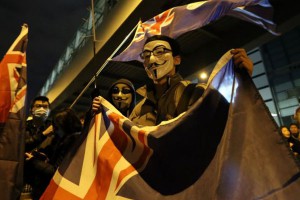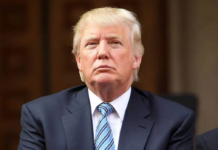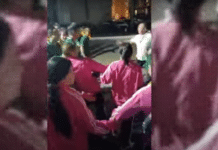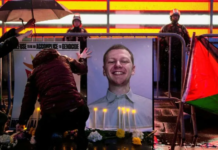Marchers demand Chief Executive CY Leung’s resignation and one person one vote
Dikang, Socialist Action (CWI in Hong Kong)
An estimated 130,000 joined protest marches on 1 January against Hong Kong’s leader Leung Chun-ying, also known as “CY”. His government is just six months old and the New Year’s Day protests were only the latest expression of mass anger towards the unelected government, and the pressure is clearly mounting.
Protesters depicted CY as a wolf, a vampire, and a long-nosed Pinocchio – due to his lying ways. The number “689” appeared on many banners – signifying the miniscule number of votes won by Leung in last March’s elite-only “election” from which 99.9% of the population were excluded.
They chanted “Down with Leung Chun-ying” and “Democracy now”. The protests took place one week before an impeachment motion will be moved by League of Social Democrats lawmaker ‘Long Hair’ Leung Kwok-hung in Hong Kong’s pseudo-parliament, the Legco. Smaller marches consisting overwhelmingly of elderly people were also organised on 1 January to show support for CY. These were staged by groups linked to the ruling ‘Communist Party’ (CCP) in China. Even the police figures, which are unreliable, say the anti-CY protests were triple the size of his supporters’ demos.
Policing of mass protests in Hong Kong has become more restrictive and heavy-handed, and New Year’s Day was no exception, with one-third of the territory’s police force deployed for the demonstrations. The police announced weeks before hand they would stop campaign groups from erecting stalls and raising money along the march route, a traditional way for opposition groups to win support and an important democratic right that must be actively defended. Almost all groups ignored this threat and set up campaign stalls.
The demonstration continued late into the night, with police cordoning off the roads leading to CY’s house, and other areas of central Hong Kong, in an attempt to block sections of the marchers intent on staging occupations. At around midnight police arrested several protesters including ‘Long Hair’ and removed tents set up by the demonstrators at Government House.
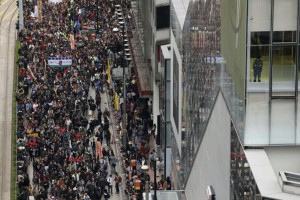
Interest in socialist ideas
The supporters of the CWI, Socialist Action, set up two stalls to promote the January 2013 issue of Socialist magazine and spread our socialist message. To show how the mass of demonstrators reject the bullyboy threats of the police against democratic rights, our stalls raised over 31,000 Hong Kong dollars. Over 340 issues of the magazine were bought.
Hong Kong and international media reports have made much of the reappearance of British colonial-era flags held by some demonstrators. This has been a trend in recent months, and CCP leaders have vented their fury over this, as proof they say that “external forces” are attempting to subvert Hong Kong, linking this issue to the need to pass repressive security legislation under Article 23 of the Basic Law.
While one on hand the colonial flag has been adopted by some relatively small groups arguing for greater autonomy and in some cases independence for Hong Kong, but also echoing chauvinist and racist ideas against mainland Chinese people, this trend has also be taken up by other layers loosely connected via the internet. For the latter the colonial flag is a way to show opposition to the government and CCP, a bit like the trend in wearing Vendetta masks among some demonstrators. Socialists defend democratic rights and freedom of expression, while opposing the confused and often reactionary ideas symbolised by the colonial flag.
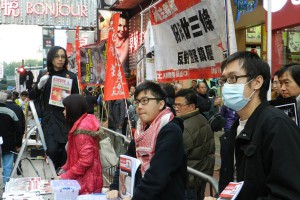
Crisis of the whole system
Rather than the personal ‘failings’ or lack of ‘integrity’ of one politician, Hong Kong faces a crisis of the entire political system – of capitalist leaders imposed by the CCP dictatorship riding roughshod over the democratic aspirations of the people.
Despite its short history, CY’s administration has put hundreds of thousands of protesters onto the streets – with 400,000 marching on July 1 when he took office, and over 120,000 in the massive battle over national education (school brainwashing) in September. Mass protests are likely to continue as the threat of Article 23 comes a step closer. This threat is implicit in the appointment of hard-liner Zhang Xiaoming as head of the Hong Kong-mainland Liaison Office and Zhang Dejiang within China’s ruling politburo standing committee as the top man for Hong Kong affairs. Zhang has shown himself to be a hard-liner for example as Guangdong CCP boss in 2005, when up to 20 protesters were shot dead in the Shanwei massacre.
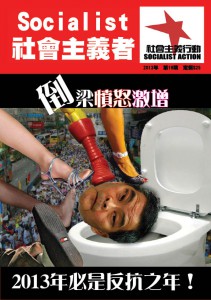
Always and everywhere, the CCP combines the “carrot” with the “stick” (negotiations with repression) and will try to win over or neutralise some of Hong Kong’s pan democratic (opposition) parties by dangling the possibility of a trade-off over the electoral rules for the 2017 Chief Executive election. This shows the need for democratic structures – elected committees – to organise the anti-CY mass struggle and insure that unaccountable “leaders” do not enter into secret deals with the government. This was unfortunately what happened with the mass “Occupy Tamar” movement against national education.
In his scramble last March against Henry Tang Ying-yen for the required 600-plus votes, CY threw around some populist promises to tackle the housing crisis, build more public housing and tilt policy-making in favour of the poor. As Socialist Action warned at that time, nothing has come of this. Some small measures (increased stamp duties for example) have been imposed to cool the housing market, but mass-market house prices still rose by more then 23 percent in 2012, worsening the agony for millions who cannot afford a home.
For the poorest section of society the housing crisis already means acute misery. The scandal of subdivided flats is far worse than previously reported, with an estimated 250,000 people – double the previous estimates – cramped into these tiny units. It is hardly surprising therefore that people rage over CY’s multiple luxury homes with their illegal construction work.
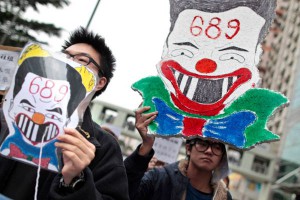
Democratic election in 2017?
After decades of delays, lies, and manoeuvres, it is becoming harder for the Beijing and Hong Kong elites to stonewall over universal suffrage. Mass pressure is growing, as reflected in the hostility to CY, and this is forcing the government’s hand to offer at least an appearance of “progress” over the election rules for 2017 (Chief Executive election) and 2020 (Legco elections). But this does not mean they will commit to real universal suffrage, even on the far-from-democratic lines that apply in Western countries, where politics is still (but more subtly) controlled by business interests. This issue will be decided by mass struggle in coming years.
We must be prepared for more manoeuvres and trickery as the clock ticks towards 2017. The government on behalf of the capitalists will seek to maintain undemocratic ‘safeguards’, albeit with some cosmetic changes, to insure a sufficiently tight nomination threshold so that candidates deemed undesirable never make it onto the ballot paper.
Time and again we have seen how the leaders of the right-wing pan democratic parties have been afraid and unwilling to lead real struggle against the government. This was the case in 2010, when they boycotted the ‘de facto referendum’ and entered into secret talks with Beijing’s representatives, supporting a facelift and extension for the elitist business-based functional constituencies. For this betrayal the Democratic Party (DPHK) especially were roundly punished in the Legco elections held in September 2012, losing around 100,000 votes compared with the previous election of 2008.
The mass movement against national education offers key lessons for the next stages of the struggle against CY and Article 23. This movement had the potential already last autumn to force CY from office. The mass daily occupations grew beyond the expectations of the movement’s leadership in the Civil Alliance Against National Education, which was essentially controlled by the DPHK and its close ally the Professional Teachers’ Union. This leadership lagged far behind the political mood of the mass protests, which for example chanted for CY to resign and supported the slogan advanced by Socialist Action for a citywide school strike. The Alliance distanced themselves from these “political” slogans, however, insisting this movement was “only” about national education – when in fact it was a dress rehearsal for the much wider struggle for universal suffrage, against Article 23, and to challenge the entire rotten system.
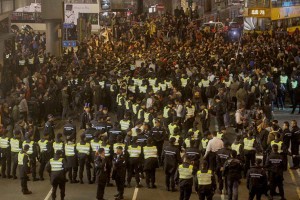
The way forward
The anti-brainwashing protests could have achieved much bigger concessions in September but for the backroom deal between the Alliance leaders and government negotiators done over the heads of the mass demonstrations that led them to abruptly call off the mass struggle.
Many activists and youth are today discussing ways to escalate the anti-CY movement, with ideas about occupations and a possible return to Tamar-style encampments. The idea of strike action, which we put forward for schools and college students as a first step, in order to defeat the national education plan, will again become a key question for this wider struggle, and not only for students but for the working class whose power to force change is much greater.
There is an urgent need for fighting organisations especially based upon the working class, as well as democratic campaign structures to insure that all such proposals are widely discussed and anchored among the broadest layers of the activists. It is a question of leadership and programme for the mass struggle – and which organisational forms best facilitate the testing and selection of a leadership that can steer the struggle to victory. Socialist Action will continue to play an active part in the coming protests, arguing the need to link the democratic struggle in Hong Kong and in China, to defeat CY and the one-party dictatorship, with the need to build a mass workers’ party and overthrow capitalism.
This is an abridged version of the article Mass opposition to CY growing from the latest issue of Socialist magazine. The magazine (available in Chinese language only) can be ordered from[email protected].
